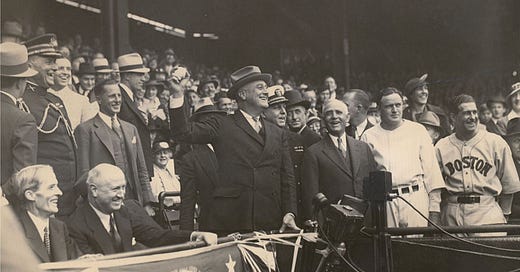Politics As Sport
Theodore Roosevelt was, many would say, the first entertaining president the US had ever seen. He was a bombastic figure, exploding with energy and personality; he was once described as a “steam calliope”—when he walked down the street, no one could look away from him. TR hunted and rode horses and boxed and gave loud speeches in which he gesticulated wildly with his arms and grinned like a madman. In a sense, this entertaining quality helped him reach the people, garner their support, and use their backing to move legislation and public policy. In another sense, this expectation that a public figure has to be an entertainer has cost us our understanding of the importance and significance government and politics have on our lives. Many of us have come to see politics as a spectator sport—we’ve chosen our “teams”: Democrats vs. Republicans, liberals vs. conservatives—and this kind of hollowing out of public service is harmful to our moral health and collective wellbeing.
We can partly blame cable news for this shallow approach to political thought. Watching a broadcast of a presidential debate and Monday Night Football: the tone and graphics are essentially the same. The network pundits—like sports analysts—spend their time talking about statistics and win probabilities, political maneuvers and strategy. And in this flashy network framing and punditry gets lost the potential effects a candidate’s policy goals would have on people; all this emphasis on winning without a discussion on why winning the contest is important. This eventually gets people conflating sports and politics—as far as meaningfulness—and we forget the link between politics and government.
When we forget the link between politics and government, we misunderstand what government is for. The broad purpose of government is to set rules we all follow and to address our collective problems, to manage society and take care of one another. The government manages infrastructure, finance, and the environment; provides social safety nets, emergency services, and free education; it’s a place where we can all work together. To make government and politics all about winning and losing is to weaken the moral and social fibers of a people.
Politics should not be entertaining the way sports or movies are entertaining; politics should be engaging and intellectually stimulating. We should understand that sports and movies have no bearing on our lives—on what our taxes pay for, on our civil rights—but politics and government have tangible effects on society and are about much more than “my side vs. your side.” We’ve accomplished great things when we’ve understood the potential of government: we defeated fascism, we went to the moon, we built the worldwide web. Government can be a powerful tool; let’s not get lost in the gamesmanship of politics.




